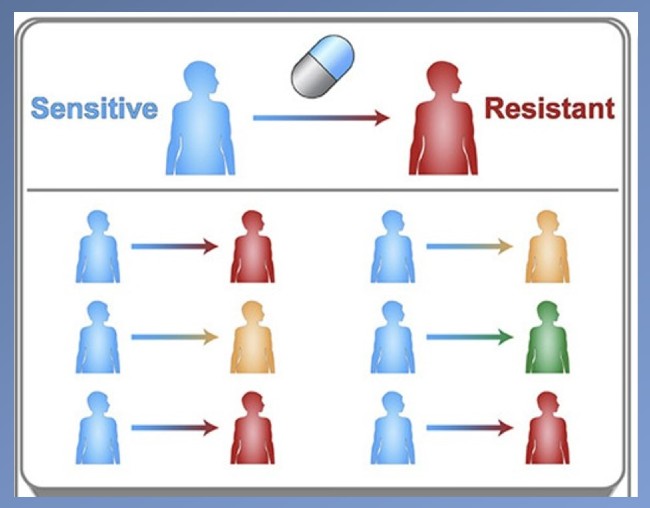If a parent or close relative has rheumatoid arthritis (RA), a potentially disabling autoimmune disease, you may wonder if you will develop it, too. The answer is probably no. Susceptibility to RA can be inherited, but not the disease itself. According to the American College of Rheumatology (ACR), family members of people with RA have a 0.8% risk of developing it compared to 0.5% for people without a family history.
You may have heard that the heritability of RA is around 60%; That doesn’t mean the ACR statistics are wrong. Heritability is an estimate of the degree to which genes explain the risk of disease in a population. A heritability of sixty percent does not mean that 60% of RA cases are inherited; means that genes account for more than half of the RA susceptibility found in northern Europeans, who dominate most genetic studies. It is also increasingly clear that genetic risk for RA varies across races and ethnicities.
Most scientists think that RA, although not well understood, usually results from the interaction of genetic susceptibility and environmental and lifestyle factors. An increasingly important school of thought also focuses on epigenetics. This refers to the way factors such as diet or exercise change the way genes work. Although epigenetic changes do not alter DNA, they can be passed on to future generations. There are certain risk factors for rheumatoid arthritis that you can’t change, but others that you may be able to control.
RA Risk Factors You Can’t Control
- Age. Conventional wisdom says that the likelihood of RA increases with age. But experts say that RA that develops after age 60 (called late-onset RA) is different from RA in younger people. Additionally, the risk as we age may not be as great as originally thought; Current research shows that RA antibodies develop many years before symptoms appear.
- Biological sex. RA is much more common in people born female than in those born male. The disparity is often attributed to hormones, mainly because RA can get better or worse as hormones change. However, studies on the relationship between RA and sex hormones show mixed results. More recent theories focus on women’s stronger immune response to infections, which generates more antibodies, and differences in the innate immune system.
- Your genes. Hundreds of genetic variants, especially a genetic marker called a shared epitope, are associated with RA, but their exact function is unclear. Many people who have these genetic variants never develop RA, while others who do not develop arthritis or other autoimmune diseases. Genes can influence the progression of RA or the response to treatment, but they alone are not enough to cause the disease.
Environmental risk factors
You may not always be able to avoid environmental risk factors, such as infections and toxins, but it is important to know that they can trigger RA, especially in genetically susceptible people.
- Infections. Epstein-Barr virus, Escherichia coli (E. coli), and hepatitis C have been suggested as possible causes of autoimmunity and RA. One theory is that the immune system overreacts to infections, creating chronic inflammation and, ultimately, autoimmune arthritis. Some scientists also believe that there may be cross-reactivity between certain antibodies and healthy cells. Normally, antibodies only attack a single antigen, but antibodies produced against Epstein-Barr, for example, can also attack normal tissue.
- Toxins. Many different toxins, pollutants, and chemicals have been linked to RA, but not all are proven. Those with a clear association include secondhand smoke, asbestos, silica dust, and pesticides. Chronic lung inflammation is known to lead to the formation of autoantibodies, and scientists speculate that these may travel from the lungs to distant sites, including the joints. Many more toxins are likely involved in RA, but more research is needed to find the worst culprits.
- Childhood trauma. Violence, abuse and neglect in childhood are increasingly linked to RA in adults. Emotional distress is known to trigger an immune response that can lead to autoimmune diseases. It is also one of the factors that affect arthritis pain and other symptoms. In one study, adults with RA and a history of childhood trauma were found to have significantly more pain than similar patients without a history of trauma.
Lifestyle risk factors
A healthy lifestyle can help prevent RA, no matter what your genetic risk is. Some rheumatologists say the new paradigm for RA is to treat it as a preventable condition, much like heart disease, in part because it is possible to control some common risk factors, including:
- Smoking. Tobacco smoke is a known risk factor for RA, as well as heart disease and a number of other chronic conditions. It is involved in the transition from preclinical RA, when autoantibodies are present but no symptoms, to full-blown disease. It can even trigger RA in someone who is not genetically susceptible, especially those who smoke at least a pack a day for 20 years or more. If you already have RA, smoking can make your treatment less effective and your symptoms more severe.
- Obesity. Excess weight can trigger systemic inflammation because fat cells release inflammatory proteins called cytokines, which play a critical role in the destruction of joint tissue. The more fat cells you have, the more cytokines your body will produce. Being overweight or obese also makes you less likely to respond adequately to arthritis medications or achieve remission of the disease.
- Gum disease. It is now well established that gum disease is a factor that causes RA, as well as lung disease, heart disease, and Alzheimer’s. Your mouth has more than 700 species of bacteria. Most microbes are beneficial and help keep harmful bacteria under control. When harmful bacteria override these defenses, gingivitis and oral cancer can develop. You can also breathe bacteria into your lungs, where they cause massive inflammation. The inflammation can then spread to other parts of the body, including the joints.
- Food. Although there is no specific diet for arthritis, the type of foods you eat affects all aspects of your health. Avoiding some foods, such as red meat, dairy products, sugar and high fructose syrup, and emphasizing fish, vegetables and olive oil, can make a difference in developing arthritis and improving existing symptoms.
- Changes in the microbiome. Over the past 20 years, the microbiome (the vast communities of beneficial microorganisms that live in the body) has been recognized as a critical determinant of health and disease. This is especially true for autoimmune diseases like RA because the microbiome regulates and is regulated by the immune system. Although every corner of the body has a microbiome, those in the mouth and intestine are the largest and have the greatest impact on health. Ideally, the trillions of microorganisms in these communities work in harmony to maintain a state of balance that helps prevent disease. When that balance is upset, some beneficial species of microbes lose their dominance and others that may be harmful or found in smaller quantities take over. When this happens, you are more likely to develop chronic diseases such as diabetes, metabolic syndrome, or RA. The composition of your gut microbiome can vary depending on your age (the microbiome changes as you age), your diet, your race, your ethnicity, and where you live. It is unclear what a normal microbiome looks like. However, it is clear that people with RA and other autoimmune diseases have different proportions of gut microbes compared to healthy people. They also have less microbial diversity, sometimes much less. The loss of certain microorganisms means there is less protection against inflammation and autoimmunity. Leaky gut, another risk, occurs when inflammation and changes in the composition of the microbiome make the intestinal wall more permeable and allow bacteria to escape to the rest of the body. This produces even more inflammation and can eventually lead to RA. Many things can upset the balance of the microbiome, and antibiotics top the list. But certain foods also contribute, especially red and processed meats, sugar and dairy products, as well as stress, lack of exercise, trauma and alcohol consumption. Scientists believe we shape the microbiome almost as much as it shapes us.
Since these and other RA risk factors are under your control, you have every reason to feel positive about their ability to help you and your family stay healthy.



